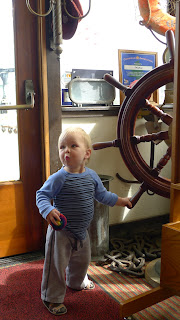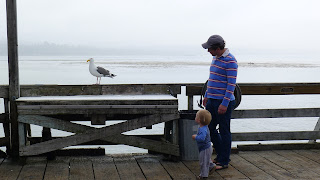A few years ago, Porter's Grandma Teri and Aunt Anna became bee keepers. Before that, his Granddad Craig and Grandma Teri were (and still are) avid gardeners. As we all know, bees and plants have a symbiotic relationship, without which our world would cease to exist. And the beautiful gardens we know and love would suck. Now, because of a stuffed bee, Porter also has a thing for stripey honey makers.
Bees are good and necessary. We like bees, despite their kamikaze tendencies. So, as you can imagine, the whole Colony Collapse Disorder was understood and taken seriously by our families. It's bad, real bad. Just a few weeks ago I came upon this article in "The Week" magazine, explaining where Colony Collapse probably stems from. Low and behold, it's caused by current pesticide practices. An entirely human caused conundrum. Here's what the article says,
"Why Honeybees Are Disappearing
The mystery of the massive die-off of honeybees may have been solved. Three new studies point to a widely used class of pesticides called neonicotinoids as the main reason for “colony collapse disorder,” in which millions of honeybees and bumblebees have died off in the U.S. and Europe in the past decade. Developed in the 1990s, neonicotinoids disrupt the nervous systems of insects that destroy crops. The pesticides are commonly used in agriculture and backyard gardening products, and have made their way into the corn syrup that many beekeepers feed their hives after harvesting honey. Around the time colonies started collapsing, farmers began heavily treating corn crops—used to make the syrup—with neonicotinoids. Studies indicate that the pesticide can be found in many honeybees, which pollinate more than a third of U.S. crops. “It apparently doesn’t take much of the pesticide to affect the bees,” Harvard University biologist Chensheng Lu tells Scientific American. He found that even trace amounts killed off hives within six months. In other studies, honey-bees fed neonicotinoids got lost while foraging, and bumblebees produced radically fewer queens. Says Pennsylvania beekeeper Dave Hackenberg, “We’ve got a toxic mess.”
I'll leave you with that to ponder while I show you how bees have been playing a role in our everyday lives. Porter received a stuffed bee for Christmas and has been sleeping with it for the last few months. Luke and I jokingly called it Busy Bee, in reference to the movie Best In Show. It stuck and now Porter calls it "Bei Bee". Busy Bee makes going to sleep a little easier when travelling and sometimes makes it to the living room after waking up in the morning. Mostly he lives in Porter's bed and sleeps, a lot. It is the least busy bee I've ever known. But it is soft and cuddly.
 | ||
The bee that started it all, in it's habitat, bed.
As of today I dubbed Porter the bee whisperer. He's fascinated with the insects, and having hundreds of them working in our front yard is naturally intriguing for him. He got the memo about not touching them, but not so much about walking through them. I looked up and found him standing in the middle of the bee zone with 10's of bees flying all about him, head to toe. I knew I had to keep calm so the bees wouldn't sense my freak out-ed-ness and then freak out on my baby in turn. He just stood there, smiling happily watching the bees zoom around him. Not knowing that bees sting he was delighted to be in the midst of their thrumming and buzzing. I asked him to walk to me on the driveway, and after a few LONG seconds, he did. Totally unscathed and unaware of any danger. It was a good thing! Post bee whispering Demanding to be given the camera. Me and my bee loving baby. |







































































